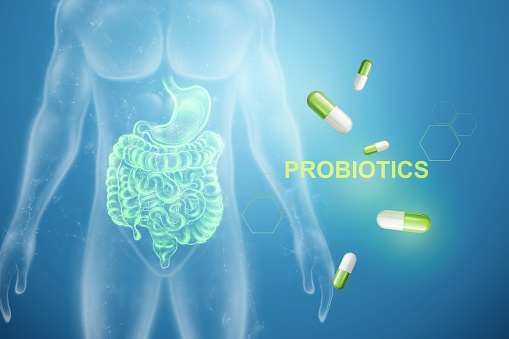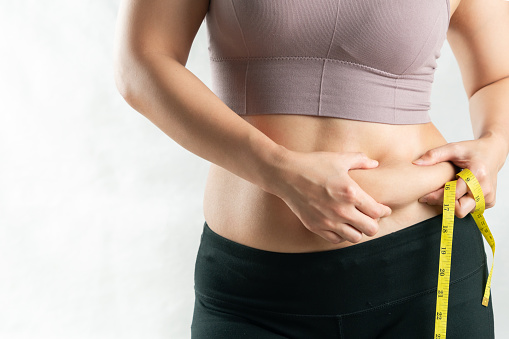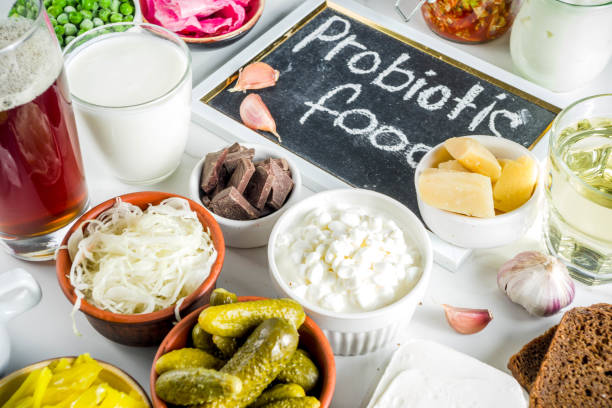Well, you must have been there! While enjoying your favorite meal, suddenly you realize that your stomach is swollen and it’s pressing onto the waste bands of your trousers.
The situation triggers absolute discomfort, and instead of enjoying your meal, you rush to find ways to get rid of it. Almost everyone is familiar with this common yet painstaking condition called bloating.
While there is a ton of information on how to eliminate bloating, only a few methods actually work. So, if you are desperately searching for the real way to combat bloating, here’s the thing – a good probiotic supplement.
There is a growing body of evidence showing that probiotic supplements can effectively relieve bloating. And we’ve presented some of the facts in this article.
Bloating & Gut Health: Understanding The Connection
There are trillions of microorganisms in the gut, collectively referred to as the microbiome. They are responsible for maintaining optimal digestive health. This convoy of bacteria protects you from digestive issues like bloating.
Some common causes of gut health issues include irregular diet, inappropriate lifestyle, and medical conditions. As a result, you may feel uncomfortable and experience bloating. This is where probiotic supplements come into play.
As the name suggests, probiotic supplements contain probiotics – live microorganisms that have evolved with humans. Probiotics are utterly efficient in treating gut health-related issues like bloating, anxiety, and weakened immune systems. Probiotics effectively restore balance in the microbiome, helping you to remove the root cause of bloating and its associated symptoms like constipation, gas, etc.
How Does Bloating In The Stomach Occur?
Bloating occurs when your gastrointestinal tract gets filled with gas or air. Bloating may lead to discomfort, heavy feeling after eating, and sometimes, pain. The gut microbiome contains different gut bacteria strains, and environmental and lifestyle patterns influence the well-being of gut health. Several reasons affect these gut bacteria, resulting in poor gut health.
The Causes of Bloating
Food
Food plays a crucial role in maintaining the optimal health of the gut microbiome, and a change in diet may get a rapid response from the gut bacteria. The lifespan of a microbe is as little as twenty minutes, which points to the fact that the composition of your microbiome can change quickly when you eat healthy foods.
Prebiotics, the foods that feed the beneficial bacteria, and probiotics, or the good bacteria you consume, work as the building blocks of a microbiome-friendly diet.
A diet that’s beneficial for your gut health should include plant-based foods. Besides, the amount should be right – adequate but not too much. It’s worth remembering that your gut bacteria can thrive only when they get adequate amounts of food that are perfectly nutritious.
When you wisely combine plant-based diets with animal products, it helps you reduce the count of bad bacteria. Besides, it aids in a healthy gut. Junks, on the other hand, affect your gut adversely. Sweeteners, sugar, artificially flavored food, refined carbohydrates, and chemical preservatives are low in gut-supporting fiber.
Sadly, the modern convenience diet is high in these materials. This creates room for imbalance, and the bad bacteria thrive, and the good ones get reduced in the count. These bad bacteria (firmicutes) may work as one of the primary causes of bloating. Thus, if you have the habit of consuming junk and unhealthy foods, bring a change immediately.
Small Intestinal Bacterial Overgrowth
SIBO, or Small Intestinal Bacterial overgrowth, is a condition when the overall bacteria population in the small intestine increases abnormally. This condition is also called blind loop syndrome.
Small Intestinal Bacterial overgrowth typically kicks in when a number of factors like diseases or surgeries may slow the passage of both food and waste products in the digestive tract. This leads to an ideal environment for bacteria to thrive and grow.
Excess bacteria may create room for bloating. Besides, they can cause unnecessary weight loss and malnutrition in the long run. Typically, SIBO triggers after complicated stomach surgery. However, it may also occur because of structural problems.
Food Allergies
When you develop any kind of food allergy, it’s pretty common to experience bloating. Typically, 90% of food allergies trigger by milk, soy, eggs, peanuts, shellfish, and nuts.
A food allergy confuses the immune system and forces it to target harmless food proteins. Known as allergens, these proteins are attacked by the body. As a result, your body releases some chemicals like histamine, which passes into your bloodstream and brings in allergic symptoms.
Common food allergy symptoms include runny nose, sneezing, rashes, shortness of breath, and bloating. Apart from food allergies, food intolerance may also trigger bloating. Food intolerance differs from food allergies; it’s all about the gas and bloating your experience after eating a number of specific foods. Unlike allergies, food intolerance never crosses the territory of the digestive tract. Food intolerances are, however, not life-threatening like food allergies.
Irritable Bowel Syndrome
Irritable bowel syndrome or inflammatory bowel disease is a condition that typically affects large intestines. It’s a chronic disorder that you may need to manage for a long. Irritable bowel syndrome is, however, rarely severe.
A few simple changes in diet and lifestyle can help to control irritable bowel syndrome. Bloating is one of the most common symptoms of irritable bowel syndrome. Other symptoms include the presence of mucus in stool, inconsistent bowel movement, etc.
Stress
Stress and gut health are closely related. The gut is called the second brain of the human body. Besides, it shares a unique relationship with the brain, which is called the gut-brain axis. When you suffer stress, your body translates it as a threat. In response to this, your digestive system stops responding. Naturally, this leads to indigestion, constipation, abdominal cramps, and bloating.
Constipation
Flushing out the waste from your body is as important as grabbing healthy foods. When you don’t eliminate waste, it can cause unwanted bacteria accumulation in the intestine. If it goes for long, it can even turn into SIBO. Stimulation of food and digestion in the digestive system is extremely crucial.
It helps control the bloating symptoms and trouble bowels. Typically, if you are suffering from constipation, you should consider adding a natural supplement that contains bifidobacterium lactis, which promotes regular bowel movements, easing constipation-related discomforts.
Dysbiosis
Dysbiosis is a condition that involves the loss of beneficial bacteria and overgrowth of pathogenic bacteria. This leads to an overall reduction in species diversity. This state of imbalance can cause bloating as the group of beneficial bacteria help to digest foods that are rich in fiber.
Apart from bloating, dysbiosis can also create room for diarrhea, constipation, flatulence, etc. A few bacterial groups like Clostridia and Enterobacteriaceae contribute more gas. High sugar levels, genetic factors, antibiotics, and poor diet can cause dysbiosis. The best way to treat bloating caused by dysbiosis is taking a probiotic supplement that helps rebalance the count of good bacteria in your body.
How To Get Rid Of Bloating?
Addressing lifestyle and diet factors may help ease bloating. There are several ways to support gut health. Some of the most effective ones are mentioned below.
Cut Down Sugar
Refined white sugars contribute to poor gut health as they help pathogenic bacteria to thrive. This may lead to dysbiosis and cause bloating. Therefore, be careful with sugar consumption.
Grab Soluble Fiber
Good bacteria get their food from soluble fibers. They support proper bowel movements and help relieve constipation. As a result, you get relief from bloating.
Introduce A Low FODMAP Diet
FODMAP refers to fermentable oligosaccharides, disaccharides, monosaccharides, and polyols. You can find these specific carbohydrates in specific foods. FODMAP, however, causes several digestive health hazards like dysbiosis, SIBO, etc. it happens because FODMAPs are high in starches and complex sugar.
Besides, they feed gut bacteria and push them to proliferate. This may also call for fructose malabsorption, eventually leading to bloating and pain in the abdomen. Therefore, switch to a diet that is low in fermentable foods. It will help reduce the chances of bacterial overgrowth
Consume Good Probiotics Supplements
A few probiotic strains help improve digestive enzyme output by breaking down what you eat. These probiotics aim to provide relief from bloating. Research well and find out one of such probiotic supplements and include it in your diet.
Avoid Overeating
A reduction in food fermentation and avoiding frequent snacking can help prevent SIBO. Besides, overeating may also cause nausea, lack of appetite, constipation, and other digestive issues. Therefore, you should always avoid eating more than what you can.
Natural Remedies And Supplements
A few natural remedies and supplements, like magnesium, ginger tea, etc., helps cleanse the bowel and avoid bloating.
Probiotics For Bloating – How Does It Work?
Probiotics refer to the group of good bacteria or yeast which benefits our health. Once you consume them, they reach the stomach and embark on the next stage of their journey. When your body releases these beneficial bacteria to your small intestines, some probiotic strains start to reside there for a short span.
Others may pass through the small intestine and reach the large intestine. Where the probiotics will reside is determined by the particular conditions in the various areas of the gut. These conditions include the levels of alkalinity or acidity (pH), the type of bacteria microbiome, oxygen levels, etc.
While some areas of the gut hold more oxygen (for example, the small intestine), the others may have almost little to no oxygen (large intestine). Only a few probiotic strains that are not dependent on oxygen to thrive can stay in the large intestine. Besides, different strains have different abilities to withstand the pH level.
Some probiotic strains may find it hard to travel through the highly acidic areas of the stomach, so they find out a pH-neutral environment to survive. This is how the particular strains of bacteria choose their residence. After reaching the stomach, the probiotic supplement rapidly grows in numbers.
This way, they crowd out the count of bad strains of bacteria. The good bacteria get into a tight competition with pathogens, and the battle revolves around the basic needs of survival – the food sources and the space which keeps them alive.
In addition, probiotics also produce a few specific acids that control pathogen growth. All of these lead to an improved gut environment reviving the gut microbiome. When they join their hands with probiotics, you get tangible benefits like better digestion and elevated well-being.
When To Start Taking Probiotic Supplements?
Be careful when you start experiencing unavoidable digestive health issues like inflammation in the digestive tract, irregular bowel movements, pain and discomfort in the stomach, acid reflux, irritable bowel syndrome and bloating. They all indicate that your gut health is deteriorating, and you should start taking probiotics to support it.
Take it even more seriously when additional symptoms like frequent urinary tract infections, mood swings, joint pain, and disrupted sleep kick in.
How To Understand That Your Probiotic Supplement Is Effective Enough?
Believe it or not, the key to good health is hidden in your gut. Therefore, whenever you experience any kind of digestive issues like bloating, inflammation in the digestive tract, irritable bowel syndrome, etc., immediately address them. If you are taking a probiotic supplement to get rid of the different problems related to digestive health, your job doesn’t end there.
It’s pretty much important to keep an eye on if your probiotic supplement is really working or not. Remember, when probiotic supplements work, you will experience many improvements in symptoms like acidity, bloating, etc. A feeling of holistic wellness indicates that your probiotics are working hard to help you achieve a good gut and overall health. However, it’s essential to choose your probiotic carefully.
Why Should You Choose The Probiotic Carefully?
There’s a popular belief – all probiotics work in the same way. However, it’s nothing but a myth. Probiotics are microorganisms with significant or subtle characteristics, and they work in various ways to help with various aspects of health. For example, the lactobacilli strain prefers to reside in the small intestine. They promote the secretion of digestive enzymes to help break down food.
On the other hand, bifidobacteria typically reside in the larger intestine and aim to improve bowel movement. Moreover, these bacteria genes have different species, and each of the species may have different strains that show different effects on the body.
Therefore, it’s not ideally possible to find something like a one-size-fit solution when it comes to probiotics. Therefore, you should be very careful while picking up probiotics so that you can actually cherish the wonderful benefits it offers.
Which Probiotics Are Ideal For Bloating?
You can consume probiotics through food or by consuming probiotic supplements. There are readymade probiotic drinks, etc., available in the market; however, they typically hold a lot of sugar.
So, it’s better to bypass them. Fermented foods like plain yogurt, miso, kefir, kombucha, kimchi, etc., contains high-quality, low-sugar probiotics. However, if you are willing to take this even a few steps further, you can avail better results that relate to your individual gut health requirement.
There are a lot of probiotic strains that can evidently relieve bloating. They include but are not limited to:
- Bacillus coagulans
- Bifidobacterium lactis
- Lactobacillus acidophilus
- Saccharomyces cerevisiae
Combining probiotics with prebiotics that are present in food like leaks, onion, and garlic can help retain better results in improving gut health. Even prebiotics are available in supplement form. Additionally, you can find the combination of prebiotics and probiotics, which is known as symbiotics.
Symbiotics specifically help nourish the gut microbiome and replenish the digestive system with health-friendly bacteria. Symbiotics work efficiently because they already contain prebiotics that feeds probiotic bacteria.
Probiotic Supplement For Bloating – The Right Time To Take?
Probiotics work best when combined with a healthy diet and a proper lifestyle. Typically, the best time to consume probiotics is early morning. You can take probiotics before or with your breakfast.
How Long Do Probiotics Take To Effect?
When it comes to reducing bloating and other symptoms, probiotics naturally take some time to exhibit their effect. However, how long they will take depends on the probiotic strain, you are consuming. In addition, the composition of the gut microbiome and the symptoms that you are experiencing also contribute to the duration that probiotics take to work.
Here’s it worth mentioning that everyone has different gut microbiomes. They are as unique as fingerprints. Due to this reason, it’s almost next to impossible to predict how long you will respond to a specific probiotic supplement. Now talking about the different probiotic strains, each of them has different effects on the gut microbiome.
While some probiotics supplements may start showing their effects within a few hours of consumption, the others may take a week. Therefore, if you are considering putting yourself on probiotics supplements to keep your boating symptoms at bay, keep an eye on exactly how you feel.
When you take note of the issues that you are experiencing and tally the effects of probiotic consumption after a week with those symptoms, you can notice changes easily. This way, you can determine how long your probiotic supplement is actually taking to work.
Additional Health Benefits Offered By Probiotics
If knowing how helpful probiotics are for bloating has made you happy, its other incredible health benefits will make you happier. Probiotics’ effectiveness is not limited to gut health. Instead, they can turn out to be extremely helpful in promoting overall health. There are also probiotics for weight loss available in the market that you may consider.
Improves Skin Health
Granted, no specific probiotic strains offer particular skin health benefits. However, somehow the gut-skin axis factor correlates with skin health and probiotics. Skin is the largest organ of detoxification, and poor gut health may trigger skin problems like acne, boils, etc. However, the research on probiotics’ effect on skin health is still in its seed stage; hopefully, they will come to light soon.
Improved Immunization
Approximately 70% of our immune system is situated in the gut. This part dedicatedly works to protect gut bacteria from pathogens. When somehow the gut microbiome stops optimally, probiotics’ consumption helps modulate the immune system. A little research also suggests that probiotics can help in preventing winter bugs as well.
Helps In Reducing Flu On Colds
By improving immune health, probiotics somehow help prevent colds and flu. A few studies have found that probiotics may reduce the cold’s duration. Another large-scale study discovered that a few probiotic strains help reduce flu-like symptoms effectively.
Reducing Allergies
A few strains of probiotics may help reduce allergies like hay fever by 20%. Research is still ongoing so that the world can know more about probiotics’ effectiveness in combating allergies.
Helps In Improving Children’s Overall Health
Children’s microbiomes are not like that of adults. Due to this reason, when they consume probiotics, apart from immunization and how to improve gut health, they may also avail the benefits of probiotics on overall health. However, the theory is hypothetical, and adequate scientific evidence is required to follow it blindly.
Emotional Well-being
The microbes in your gut work as the chemical messengers which communicate with your brain. Naturally, it indicates that your brain and your gut share a direct connection. By boosting digestive health and promoting serotonin secretion, probiotics help elevate mood. This way, it contributes to emotional well-being.
FAQs Regarding Probiotics And Its Health Benefits
What Are Some Of The Most Common IBS Symptoms?
IBS or Irritable Bowel Syndrome is a condition that impacts the large intestines. Bloating, abdominal pain, diarrhea, cramping, gas, etc., are some of the most common signs that you might be having IBS.
Remember, it’s a chronic disease that requires treatment for a long tenure. Besides, if you are facing any of these symptoms, start taking good care of your diet.
What Causes Excess Gas In The Intestines?
Gas is a very common aspect of the digestive system under normal conditions. However, several factors may lead to excess gas formation resulting in abdominal pain, feeling of fullness, burping, etc. The primary reason behind the increased levels of gas formation is air swallowed while eating or drinking. Besides, high-fiber foods like whole grains, legumes, etc., can also lead to excessive gas formation.
Additionally, carbonated beverages, sugar substitutes, and health conditions like food intolerance or chronic internal disease may also be the reason behind excessive gas. By any chance, if you see a change in stool consistency or change in the movement of the bowel, weight loss, or bloody stool, it’s always a wise idea to seek medical help.
Does Probiotic Supplementation Really Work?
Yes, they do; while there are many dubious discussions about probiotics’ effectiveness, much scientific evidence says that probiotics work. Granted, these good microbes are not meant for curing disease.
However, they can definitely improve the condition. Taking supplemental bugs helps you balance your gut health and relieve symptoms like indigestion, inflamed abdomen, inflamed bowel, gassy stomach, and bloating.
Probiotics are not only available in supplementary forms; you can even find them in specific foods. For example, cake, yogurt, sourdough bread, or any kind of fermented food, etc.
However, when you start taking probiotics in supplementary form, you simply supply your gut with enough of them, which naturally increases the chances of effectiveness. When choosing your probiotic supplement, you should always consult your doctor or dietician as they can help you with the right strain and dosage.
Can You Consume Probiotics During Breastfeeding?
Probiotics don’t seem to pose any kind of safety concerns to nursing women. In fact, they positively impact the health of the new mother. Many studies have found that consumption of certain strains of probiotics helps treat mastitis.
In fact, they may even reduce crying time in babies by easing colic. The bloodstream does not absorb probiotics. Due to this reason, they hardly carry any risk to the newborn baby.
Can I refrigerate Probiotics?
It depends on what strains you are using. Certain probiotics hold sound stability and don’t require refrigeration to retain efficiency. Therefore, check before buying and confirm if your supplement requires refrigeration.
Are probiotics Suitable For Young Children And Infants?
Probiotics are suitable for all ages and are considered an integral part of a balanced diet. When a baby is unborn, its gut is sterile, and its immune system is immature. Babies’ gut microflora starts developing after birth.
Consumption of infant formula that contains probiotics or consuming supplements while breastfeeding helps develop the gut microflora of babies precisely. By the age of 2-3, most toddlers develop a stable intestinal balance. Besides, their immune system also gets matured. Both of these developments get fair benefits from regular consumption of probiotics.
Conclusion: How Do Probiotics Control Bloating?
Probiotics are evidently effective in improving gut health and facilitating digestion, and they can free you up from the discomfort triggered by bloating. However, you should choose probiotic dietary supplements carefully to enjoy their best benefits. In addition, pay attention to your diet and lifestyle as a healthy lifestyle and nutritious diet work as the key to healthfulness.








